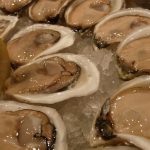If your fishing logs for five consecutive years show consistent fluke catches along a particular inshore lump for the entire month of July, yet in season six you’re skunked all the way through August, what does this tell you about the fishing?.. “It’s kind of early to figure out what’s going to happen, but it sure gives us a sense of urgency,” said Greg Hueth on July 28 at an SSFFF presentation to local stakeholders at the Reel Seat in Brielle. Hueth said scientists are “very interested in what we’re doing” in terms of the current work by researchers at the universities at Rutgers and Cornell, while adding “hopefully we’ll get a seat at the table next summer,” where the commissioned research findings can be presented.
Fisheries/Aquaculture
Rutgers 250: NJAES All-Star Variety of the Month – ‘Triploid’ Oyster
The oyster breeding program at Rutgers University has conducted over a century of cutting-edge scientific research to overcome challenges to the industry from the devastating effects of over-fishing, diseases, and climate change. Professor Ximing Guo explains his research and vision. Throughout Rutgers’ yearlong celebration of its 250th anniversary (November 2015 to November 2016), NJAES each […]
Warming Coastal Waters Lure Southern Species North
The fish population in New Jersey waters is growing more diverse, and a Rutgers University scientist says climate change is driving it… Dr. Ken Able is the director of Rutgers University’s marine field station in Tuckerton, where for 27 years, they’ve been studying the baby fish that come into the Little Egg Inlet. “And we have a distinct trend,” he says. “We have warming water temperatures, and we have fewer northern species and we have more southern species. And there’s good data to support that.”
National Oyster Day celebrates humble shellfish
The day celebrates the humble shellfish that rose from a working-class staple to a prized delicacy after oyster beds were decimated by the middle of the 20th century… Rutgers University’s Ximing Guo, a co-inventor of the triploid oyster, said that ab…
Scientists seek ways for oyster farms, red knots to co-exist on Delaware Bay
Joe Moro sold his restaurant in West Chester, Pennsylvania, several years ago and retired to North Cape May and the life of a Delaware Bay oyster farmer. Now he spends five days a week doing manual labor on the mud flats of the bay at low tide, growing…
Location matters: Delaware Bay’s tidal flats make tasty oyster
Oysters farmed on tidal flats have a flavor that seafood lovers crave… “The water quality (at the shoreline) imparts a unique sweet, salty flavor to the oyster,” said Mike DeLuca, the director of Rutgers University’s Aquaculture Innovation Center on Bayshore Road in Cape May. “Obviously growers don’t want to lose that.”
Bill would simplify aquaculture permit process
Legislation to simplify the permit process for aquaculture projects such as oyster farms in state waters was approved Thursday by the Senate Economic Growth Committee… In 2013, Rutgers University released a survey of oyster farmers in New Jersey. The…
Medical Labs May Be Killing Horseshoe Crabs
Drawing the crabs’ blue blood for vital medical testing can condemn the animals to die, even after they are returned to the sea… “There’s not very good science-based information on the mortality of the crabs. I’ve seen figures range from 15 percent to 40 percent but nobody has a really good handle on that,” says Michael De Luca, senior associate director at the Institute of Marine and Coastal Sciences at Rutgers University.
World’s richest source of oceanographic data now operational at Rutgers
The National Science Foundation awarded $11.8 million to Rutgers to launch and operate the Ocean Observatories Initiative’s data system. The data center for the pioneering Ocean Observatories Initiative, which collects and shares data from more than 800 sophisticated instruments and a transmission network across the Atlantic and Pacific oceans, is now operating at Rutgers University… “Rutgers is now the hub for the world’s richest source of new in-water oceanographic data, and we are extremely proud to have been chosen for this important work,” says Christopher J. Molloy, Rutgers’ senior vice president for research and economic development.
New England lobsters swim to Canada, bringing jobs with them
Warming waters from climate change off the Atlantic coast are driving lobsters further north than ever before, disrupting fisheries and – for some – perhaps changing a way of life forever… Malin Pinsky, an assistant professor in the Department of Eco…


